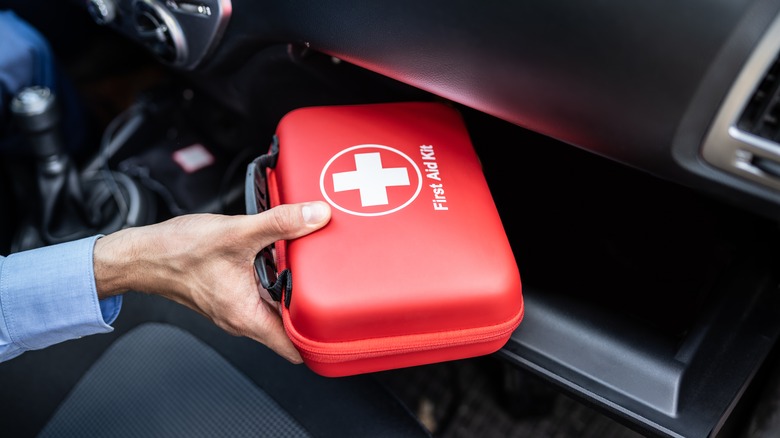One of the biggest perks of taking a road trip is the convenience. Just pack your bags, organize your trunk, fill up the gas tank, and hit the road. No need to worry about TSA security lines or delayed flights — when you’re driving, you’re in control of your trip.
However, traveling by car isn’t completely problem-free. According to data from the National Highway Traffic Safety Administration, over 6 million traffic crashes were reported in 2021. That statistic doesn’t even include non-reported fender benders or issues like flat tires and stalled engines, which can quickly derail your trip and eat away at your travel budget.
Needless to say, it’s important to protect yourself, your vehicle, and your bank account before you begin your journey. Explore reached out to Jen De La Porte, principal at Legacy Partners Insurance Agency, to find out how to prepare for a successful road trip and ensure you’re covered in case your travels take a turn for the worse. As the expert shares with us exclusively, you should give your vehicle and car insurance policy a thorough check before leaving home.
Review your car insurance policy before your trip

Road trips offer unbeatable freedom and flexibility, and unlike flying, you don’t have to follow a strict schedule or bother with tickets or passports (unless, of course, you plan to road-trip through Canada or Mexico). Still, it’s a good idea to check in with your car insurance company first, Jen De La Porte exclusively reveals to Explore. “There are several things you should know about your insurance before taking a road trip,” she explains. “Most of them can be found on your actual policy documents pages, however there may be a few you want to discuss with your agent.”
Take a look at the details of your coverage, getting into the fine print on road trips and long-distance travel. De La Porte suggests scanning for information on rental cars, roadside assistance, and out-of-state or international travel and calling a representative to clear up any confusion.
Keep in mind that your current policy might not offer enough coverage for your planned trip. “Know the liability coverage, medical payments, and comprehensive/collision coverage limits. Ensure they are sufficient for your trip, especially for long-distance driving,” the car insurance expert urges. If you need additional coverage, or if you want to update your policy to accommodate travel interruption costs and other potential road trip snafus, reach out to your insurance company before you depart.
Be prepared for the worst

No one wants to spend their road trip fearing a collision, but, unfortunately, accidents happen every day across the country. Safe driving is crucial when traveling, though it might not always be enough to prevent the worst from happening.
With this in mind, Jen De La Porte shares a few tips that can come in handy in case you break down or get hit by another driver. First, keep your insurance agent’s contact information in your vehicle and stored on your phone (having both a digital and paper copy can be useful in case your phone dies during your trip). “Having this information at hand can provide peace of mind while on the road,” De La Porte tells Explore.
Then, mentally walk through the steps you would take if you were involved in an accident. This includes essential steps such as checking for injuries and calling for emergency help. But, as our expert says, it also involves being familiar with your insurance company’s claims process. “Understand the claims process in case of an accident during your road trip. Learn about the necessary steps, required documents, and how to reach your insurance company while out of town,” recommends De La Porte.
Stay covered even when renting a car

Blackcat/Getty Images
If you don’t own a vehicle suitable for long road trips or if you’re traveling to a destination where you can’t bring your own car, renting can be a great option. However, keep in mind that your insurance policy might not cover rentals to the same extent it would your personal ride.
That doesn’t mean you should take a chance and hope for the best, especially if you plan to travel on unfamiliar roads. As Jen De La Porte explains, “It is my opinion you should always get the rental car insurance policy. It is usually inexpensive, and if something happens, [it] provides a first layer of defense instead of having it impact your own personal insurance rates.” The insurance specialist adds that this is especially critical when driving abroad, as many companies don’t cover international rental vehicles.
If you’re looking to save money, investigate alternative coverage options, such as credit card perks. De La Porte notes that your credit card company may offer protection against damage and theft, as long as you use the card to book the rental. Check with your credit card company first before relying on this option.
Get your car ready

Andrey_Popov/Shutterstock
If your car is generally used only for short trips and work commutes, it might not be in tip-top shape for a long journey — yet. Jen De La Porte suggests taking care of any vehicle maintenance ahead of time, “including checking tires, brakes, lights, and fluids.” Then, she says to stock your car with emergency essentials, including an emergency first-aid kit, flashlights, blankets, extra phone batteries, water, and non-perishable snacks. The car insurance guru also recommends drivers keep a few tools around in case their car breaks down or is involved in an accident, including jumper cables, a tire pressure gauge, and a seat belt cutter.
“As far as insurance [goes], if your carrier has an app, make sure it is downloaded and your account is connected,” De La Porte tells us. Along with the app, remember to keep your printed insurance card on hand at all times.
Know that road trips can impact your rates

Mixetto/Getty Images
A lot of factors can influence your car insurance rates, from your age to your vehicle model and even your job. And according to our chat with Jen De La Porte, road trips could also impact how much you pay. “Adding hours behind the wheel increases your chances of incident, which is one of the obvious ways we expect our insurance rates to increase,” she explains. “However, many carriers are monitoring driving mileage through many different channels.” For instance, your company may track your time on the road by using monitoring technology, vehicle inspection reports, or simply the miles recorded at the start of your policy.
If you rarely go on road trips, you may not notice any rate hikes, particularly if you continue to follow safe driving practices and avoid any accidents during your travels. But if you were hoping to qualify for a discount as a “pleasure use” driver, know that a long journey across state lines could interfere with your plan.

